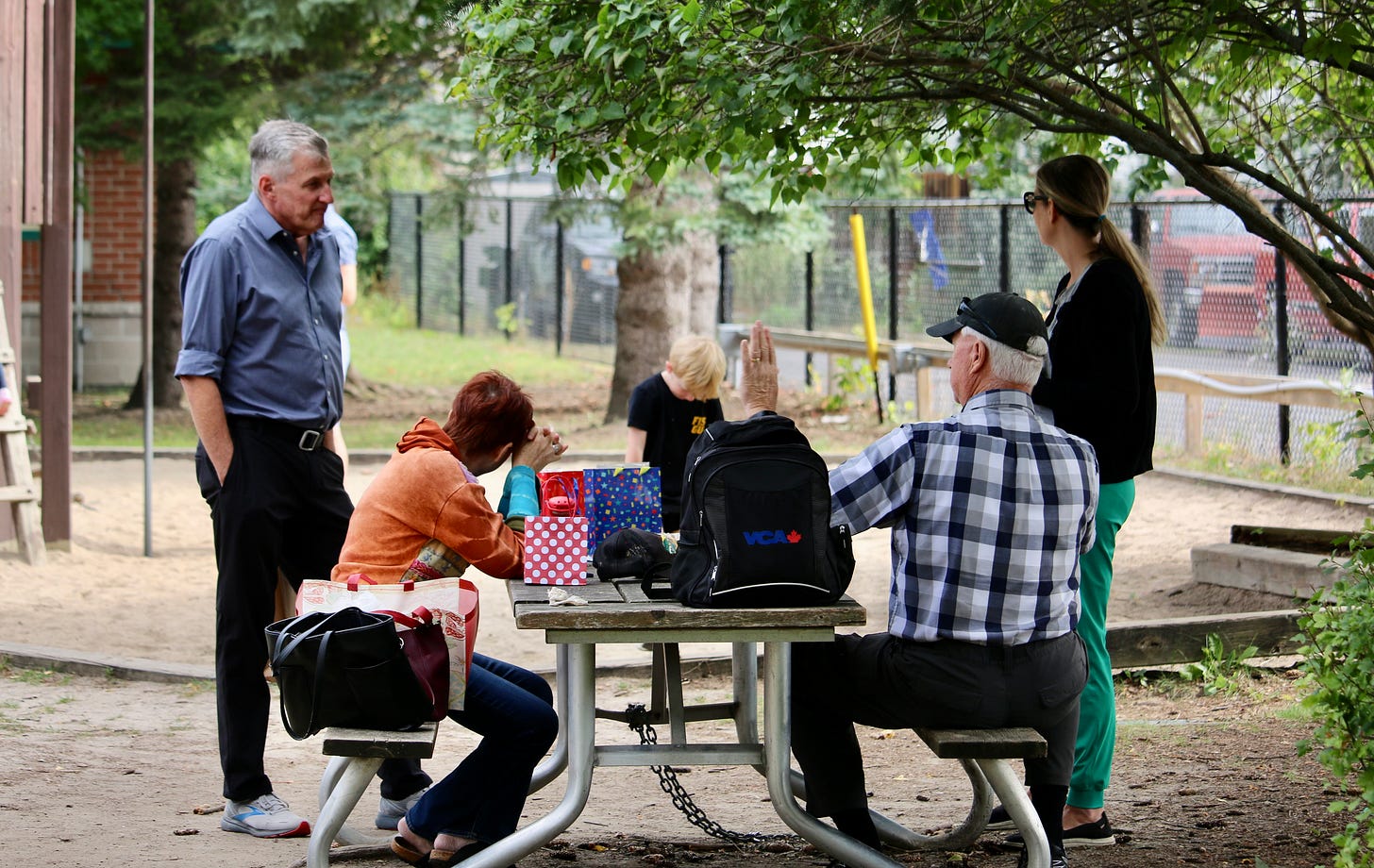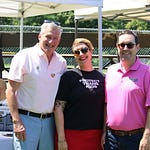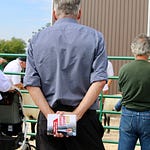The book is available in print, ebook and audio book formats.
[Chapter One] [Chapter Two] [Chapter Three]
Running is winning
“You are not welcome here.”
The man — you knew it would be a man — was a self-proclaimed fan of Pierre Poilievre living in one of the lovely suburbs of Carleton. Bruce Fanjoy had already been canvassing for several hours that day and was upbeat as usual, even though he was starting to feel tired.
Also not unusual, come to think of it. Canvassing isn’t for the faint of heart and being anywhere near it makes you gain a whole new level of appreciation for all the people over the years who’ve worked to earn the trust and votes of their fellow citizens all over Canada.
When you’re in an election campaign as the candidate for a major party, there’s people who swoop in and support you. They have lists. They have team members who constantly update those lists. They don’t work blind.
The principle is quite simple; it’s just like any other CRM in any other business. For those of you who never go anywhere near marketing, CRM means customer relationship management. There are various kinds of CRM systems on the market and each political party does it their own way.
This is the part of politics that holds precisely zero interest to me, and as a result I’ve been avoiding it most of my life. If you’re reading this hoping to find Liberal secrets, you’re in the wrong place… I wouldn’t recognize their system if it hit me in the face with my very own space bar. I know it exists, and I also know that it’s very important, because if you don’t know who the people are who might vote for you, how are you going to connect with them and ensure they actually do go out and vote for you?
Parties go knocking on doors to meet their constituents in person but also because lists can change. Sometimes, people who’ve voted one way decide to vote another way for any number of reasons.
Canvassers will try to figure out why people change their mind, because that information is critically important between elections. If your party loses more support than it gains because, say, it’s in favour of repealing abortion rights, you might want to review that policy if you care about winning.
Now that you’ve suffered through my ill-informed summary of electoral CRMs, the point I want to make is about the stuff that takes place before a party’s machinery comes in to help.
Before he became the Liberal Party nominee in June 2024, Fanjoy was essentially campaigning on his own. Some members of the early team worked to identify people who said they supported him, people who said they might think about supporting him, people who didn’t say either way, people who laughed, and that joker who thought his role was to keep the neighbourhood Liberal-free on behalf of Pierre Poilievre.
When you go door-to-door, you meet all kinds of people (and dogs; puppies are always the best part). How they treat you depends in great part on how you approach them.
Bruce Fanjoy was always upbeat and positive when he approached a new door. With very few exceptions, people responded in kind. Even when they didn’t want to talk to him at all.
That early evening when he met the decidedly unwelcoming fellow was the first time Fanjoy was wearing the Liberal-branded jacket he’d purchased at the convention in Ottawa.
Some of you are old enough to remember the late Parti Québécois premier Bernard Landry’s “chiffon rouge” remarks about the Canadian flag on federal buildings in the province. Landry said, famously, that Quebec should not prostitute itself for bits of red rag. This controversy followed him for the rest of his life because even in Quebec’s separatist circles, it was considered a bit much. Wanting Quebec to become its own independent country is one thing, but maybe it’s possible to do that without freaking out over the Canadian flag?
The Poilievre-boosting man who told Fanjoy to leave the neighbourhood, clearly, wasn’t in the mood to see the Liberal Party’s colours or to hear anyone challenging his representative. Up to a point that’s his right. Everyone in this country is entitled to their opinion and to express themselves as they see fit. But we can’t force others to listen.
In Canada, we have the enviable freedom of choosing the people who will make decisions for us in free and open contests, run by scrupulously independent institutions. Voting is a right and a privilege, and we’re all at liberty to exercise either in all the ways, or none of the ways, that seem right to us individually.
Some of us want to hear all options before casting our ballot. Others already know who they’re voting for even before they know who their local candidates are. Some people will only vote for one party because that’s their family tradition, and other people can’t remember who they voted for in the last election because their support doesn’t follow party lines. Democracy is beautiful and messy, and I wouldn’t have it any other way.
During the two years Bruce Fanjoy canvassed Carleton he met some conservative voters who did not wish to hear what he had to say as a Liberal. In virtually all cases, they were polite and civil, sometimes even friendly. They simply told Fanjoy they were not interested in Liberal policies, thanked him for participating in the process and wished him good luck.
That’s the Canadian way. We can have our differences and some of those differences can be very stark. But we respect each other enough not to get unpleasant towards one another.
This includes politicians in Parliament. While they argue in the legislature or on the campaign trail, they also cooperate on committees and elsewhere to ensure the proper functioning of our institutions.
It’s perfectly normal and healthy for people who disagree on many things to live alongside one another and get along fine. We’re adversaries, not enemies. Sometimes we’re not even adversaries. We just disagree on the best way to accomplish shared goals.
Bruce Fanjoy is a man with progressive views on most subjects, but he’s not inflexible. And while canvassing he had no problem shaking hands with Poilievre supporters and offering to talk to them about who he is and why he’s campaigning. That’s how you win elections, by convincing people who weren’t already on your side to vote for you. There’s no prize for preaching only to the choir.
That’s one key point right there, and the reason for the chapter’s title. By running for the seat, and meeting as many voters as he could, Bruce Fanjoy won almost by default as the only guy who showed up.
Pierre Poilievre was absent from the riding for years before the campaign started, and he didn’t visit very often ahead of the April 28 vote.
Being the leader of the opposition necessarily takes you away from your riding, of course. But Poilievre didn’t even try to have a presence in Carleton. He took the riding for granted.
Fanjoy never did, and that made all the difference between eking out a victory over the seven-time incumbent and winning the riding by over 4,000 votes with 80 percent turnout. Some of the people who voted for Bruce Fanjoy could have been persuaded to vote for Poilievre if he’d bothered to show up. That’s a lesson for party leaders everywhere.
I’ve met many people in Carleton over the course of the past two years, including Conservative supporters. I’m sure there were tears on election night when they realized they’d lost the riding to someone who’d never done politics before, especially given the relatively encouraging results the Tories received nationwide.
By that point it was too late, and everyone realized that. But in the two years before the vote, most Conservatives in the riding did not take Fanjoy seriously. It wasn’t personal to him. They wouldn’t have taken any challenger seriously.
Most of the time the reaction he got at the door in the early days was bugged out eyes. People come to the door expecting to meet someone they’ll have to get rid of – someone who wants to clean their gutters or convince them to love Jesus.
Bruce Fanjoy never let the unpleasant stuff faze him. In a way, he said over and over again, the minority of people who reacted to his presence with anger were making the point for him that the Conservatives under Pierre Poilievre had a tone problem, to put it mildly. Yelling at Fanjoy was one hell of a way to highlight the contrast between the two candidates angling for the seat. Fanjoy understood this. And he would use it to his advantage. Call it political judo.
On January 27, 2023, Bruce Fanjoy announced his intention to campaign for the Liberal nomination in Carleton in a tweet that he kept pinned to his Twitter profile for well over a year.
“I interrupt Pierre Poilievre’s unbroken record of accomplishing nothing for his riding or his country to announce that I’m seeking the federal Liberal nomination for #Carleton. It’s time to expect better. Please join me.”
The tweet included a link to his website, where people could find more information about who he is, what he stands for, and how they could sign up to help should they wish to.
That pinned tweet racked up nearly 600,000 impressions and over 7,200 likes in the 15 months before it got unpinned. Not bad, for someone who’s not at all famous and had (according to detractors) zero chance of succeeding in unseating the leader of the official opposition from a very comfortably blue seat.
To some of us, including Fanjoy, it’s quite clear: Something was happening in Carleton and elsewhere around the country, something that was not captured by those 2023 and 2024 opinion polls which showed the Conservatives far ahead of the Liberals in federal voting intentions. That something is that most Canadians have very little appetite for the kind of Trump-inspired, angry politics the Conservative Party under Poilievre was trying to bring to the country.
In the spring of 2025, the Liberals got re-elected albeit without a majority of seats to defend Canada against Donald Trump. It’s obvious to everyone that Trump has no coattails. Other countries around the world, including Australia, have similarly rejected Trumpian candidates in 2025 elections.
In early 2023, that was far from received wisdom. Fanjoy continued to go out every day, rain or shine or snow or sleet or whatever, and meet people all over Carleton.
He always said he wouldn’t have done all this work if he didn’t believe he could win. And one voter at a time, he got enough people to believe in his chances, too. The team of supporters and volunteers gradually grew.
One memorable conversation occurred in Manotick as he was out for a walk with his wife Donna. They’d met this particular older couple before on a previous walk, not too far from their blue house. But this time it was clear they wanted more than a neighbourly wave. Bruce and Donna stopped to listen.
Like so many people living, working, and thriving in Canada, they are immigrants. They moved here two decades ago. He is from Ukraine; she is from Russia. They teach music, which is something Fanjoy loves. Right away he could tell they were bonding, even though he often jokes that music doesn’t really love him back.
Music can be a metaphor for things that are difficult but beautiful. Or maybe beautiful precisely because they are difficult. Like this couple’s story. They had a hard time when they came to Canada, integrating into what was very different than the society they were used to. They were grateful to be here and had worked very hard to belong.
Like Fanjoy’s mother, who’d come to Canada from Scotland. Which, arguably, was closer to Canadian society than Russia. But still. We don’t always recognize the challenges people face right here in our neighbourhoods. We’re a lovely, free, prosperous and advanced nation, yet many in our midst are struggling.
I often say that the world would be a much happier and better place if most of us made a tiny bit more of an effort every day to be a little bit less of a jerk. The truth is, we could each allow more space to account for all the trauma that exists around us, whether we acknowledge it or not.
People are hurting in different ways. One of the reasons the Poilievre Conservatives did so well for so long is that they managed to tap into the anger and frustration related to the lack of affordability in housing, and rising prices on groceries and other essentials.
To their credit, the Conservatives were tackling the issue of affordability head-on, in sharp contrast to the Liberals under Justin Trudeau, who had been sluggish in answering criticisms that access to housing was becoming unattainable for young people, that inflation forced very difficult choices on so many people, and that a lot of Canadians felt nobody heard their concerns.
It wasn’t easy for Bruce Fanjoy to make the Liberal case in this context, especially before Donald Trump barged back onto the stage and started threatening us. He took the time to listen to everyone and kept making the case for the Liberals anyway, mostly by agreeing with voters like this couple that more should be done to make other people’s lives a little bit easier.
But you’re probably still scratching your head, wondering how on earth Fanjoy thought he had a chance of defeating Pierre Poilievre at the voting booth, given how sick and tired most Canadians were of Justin Trudeau.
The early team around him included people with deep knowledge of the riding, and who are better at math than I am – which isn’t saying much at all.
Together with the candidate, we’d realized that if enough disappointed Conservative voters switched to the Liberals, and if we could increase voter turnout to somewhere north of 70 percent and focused on talking to young people and women as much as possible, that there would be a path.
Convincing other progressives in the riding – Green Party and NDP voters – to vote strategically for Fanjoy, since this was the best option to defeat Poilievre, was also going to help. If we were successful in doing all of the above, he’d have it made.
In the end, voter turnout in Carleton was over 80 percent, and Fanjoy got more than half the votes cast. Clearly, the strategy worked.
In 2023, there was no way of knowing for sure that it would, but at some point, you’ve got to do the work assuming you’ll be successful. Fanjoy also knew, from the conversations he had with people in Carleton, that his chances of winning were a lot better than pollsters and other experts thought until the very day of the vote.
Politics is a people business. And Bruce Fanjoy, it turns out, is a people person. At any rate, he’s a man who listens to the people of his riding and makes them believe that he’ll represent them well.












